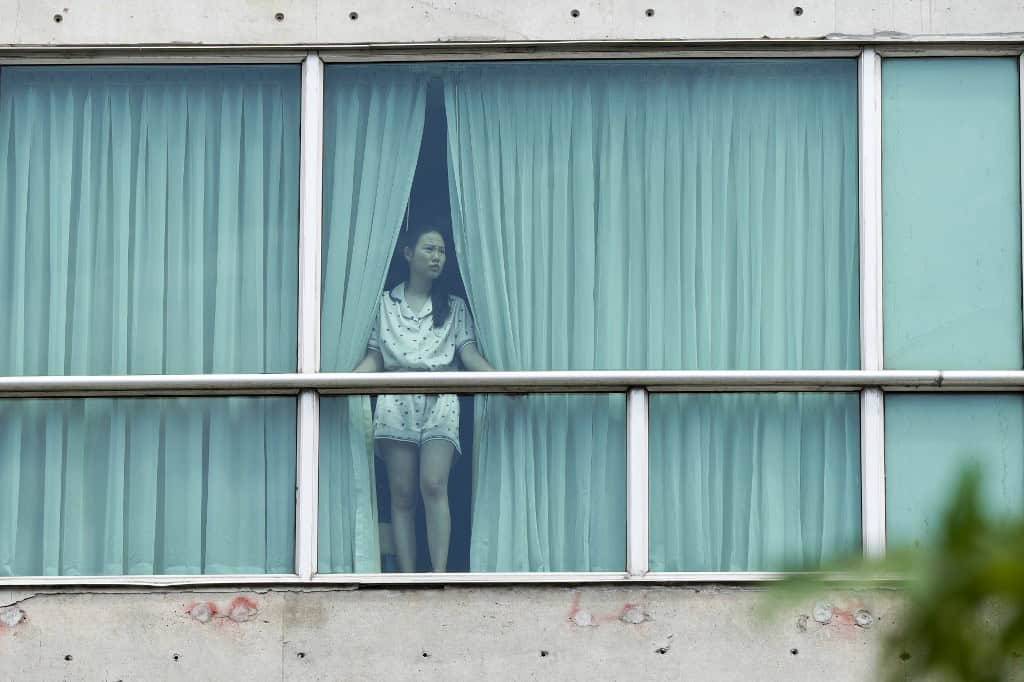“We are not safe in our country,” reads a rudimentary handwritten sign in English shown this Tuesday by women at the window of a hotel in Panama City, where nearly 300 Asian migrants deported by the United States in recent days are being held. The migrants remain in the Decapolis hotel in the Panamanian capital without the possibility of leaving, but the Minister of Public Security, Frank Ábrego, denied this Tuesday at a press conference that they are being deprived of their liberty.
However, the hotel remains guarded by police in camouflage uniforms. From other windows, a woman crossed her wrists, and others, including some children, waved when they noticed journalists taking photos from below. In some windows, clothes were hanging, and another rudimentary sign in English said: “please help us.”
“It was agreed to receive 299 people who came from the United States to be repatriated to their respective countries of origin” and “171 of them have agreed to return voluntarily,” said Ábrego. The minister appeared before the press following a report published in The New York Times, which had access to brief testimonies from some of the migrants via text messages and reported that they were stripped of their passports and most of their cell phones.
According to the American newspaper, several migrants said that at least one person tried to commit suicide in the hotel, which Ábrego said he learned about through the newspaper. “We provide them with all necessary medical care and comfort, and we will continue to do so until the last of them leaves our country, which is what was agreed with the United States government,” Ábrego stated.
During a recent Latin American tour by U.S. Secretary of State Marco Rubio, Panama and Guatemala agreed to serve as a bridge for migrants of other nationalities deported by Washington, and on Monday Costa Rica joined.
Under temporary custody
Ábrego mentioned that among the deportees sent to Panama “there are people from China, India, Iran, Vietnam” and indicated that this week “around 20 to 25 people” will be voluntarily repatriated. He explained that those who do not accept to return voluntarily to their countries will be transferred to a shelter in the Darién jungle, bordering Colombia, waiting for the International Organization for Migration (IOM) and the High Commissioner for Refugees (UNHCR) to relocate them to another country.
“We haven’t said that [the migrants] are deprived of liberty (…). They are under our temporary custody for their protection,” said Ábrego, although he acknowledged that as a “prevention” measure they cannot “circulate” in Panama because authorities don’t know their identities “in depth.”
The Ombudsman, Eduardo Leblanc, warned that it is “extremely important” to verify the parental relationship of the children and adolescents in the group of deportees “to confirm these family relationships and avoid possible risks of trafficking.” “We have been able to confirm that there is a differential issue regarding food, due to cultural and religious matters,” added Leblanc, at another press conference.
The Ombudsman also considered it necessary to give the deportees a migratory status while they wait for “their repatriation or resettlement.”
We are not being duped
Costa Rica will receive the first flight of non-national deportees on Wednesday. So far, Panama is the only one that has received deportees in transit. “We have not agreed to new arrivals of people deported from the United States” after this group of nearly 300, he indicated. Ábrego denied that Panama had been involved by Trump in a deportation scheme.
“We are not being duped or caught in anyone’s trap,” he said, ensuring that Panama has complied “with all international regulations.” Through an agreement signed in July 2024, Washington finances repatriation flights for migrants who entered Panama through the Darién. More than a thousand have been sent so far.
About 302,000 migrants, mostly Venezuelans, crossed this jungle in 2024, according to Panamanian official figures, a 41% decrease compared to 2023.






